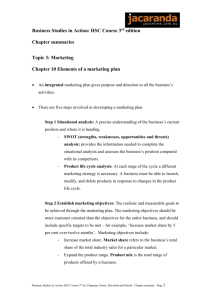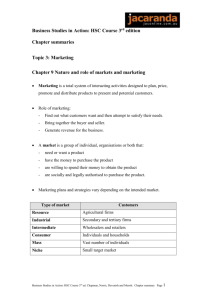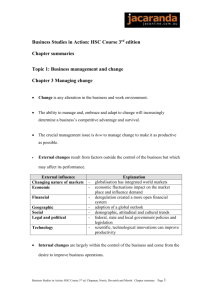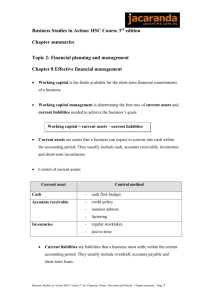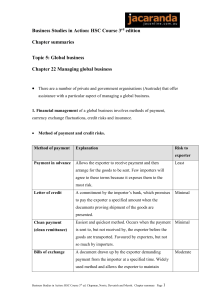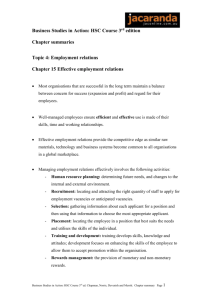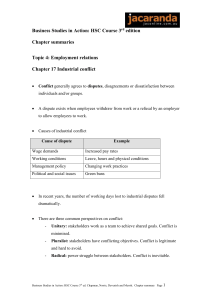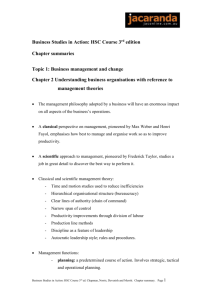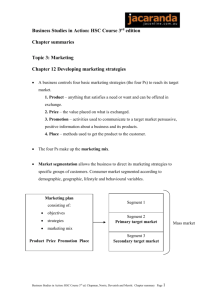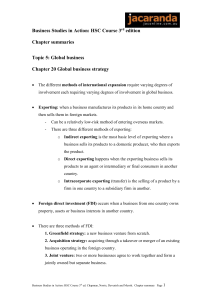Business Studies in Action: HSC Course 3rd edition
advertisement
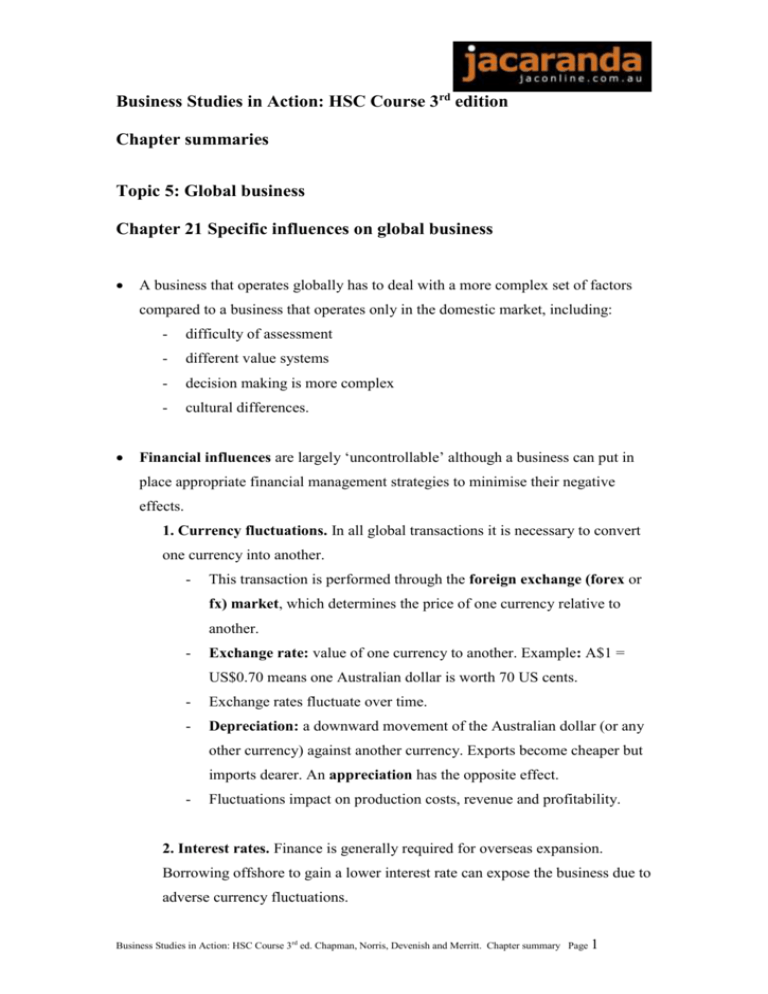
Business Studies in Action: HSC Course 3rd edition Chapter summaries Topic 5: Global business Chapter 21 Specific influences on global business A business that operates globally has to deal with a more complex set of factors compared to a business that operates only in the domestic market, including: - difficulty of assessment - different value systems - decision making is more complex - cultural differences. Financial influences are largely ‘uncontrollable’ although a business can put in place appropriate financial management strategies to minimise their negative effects. 1. Currency fluctuations. In all global transactions it is necessary to convert one currency into another. - This transaction is performed through the foreign exchange (forex or fx) market, which determines the price of one currency relative to another. - Exchange rate: value of one currency to another. Example: A$1 = US$0.70 means one Australian dollar is worth 70 US cents. - Exchange rates fluctuate over time. - Depreciation: a downward movement of the Australian dollar (or any other currency) against another currency. Exports become cheaper but imports dearer. An appreciation has the opposite effect. - Fluctuations impact on production costs, revenue and profitability. 2. Interest rates. Finance is generally required for overseas expansion. Borrowing offshore to gain a lower interest rate can expose the business due to adverse currency fluctuations. Business Studies in Action: HSC Course 3rd ed. Chapman, Norris, Devenish and Merritt. Chapter summary Page 1 3. Overseas borrowing. There is a diverse range of debt and equity sources within the international capital market. However, there are two main sources: - International equity (share) market. This involves selling shares of ownership to new or existing owners worldwide. - International bond market. A bond is an IOU from one business to another and requires the borrower to repay a certain amount, plus interest, by a specified date. Political influences. A political risk is any political event that results in a drastic change to the country’s business environment and ultimately has a negative impact upon business operations and profit. Political risks tend to be greater in countries experiencing social and economic unrest. Some political influences could act as incentives, encouraging businesses to relocate. 1. Tension between protectionism and free trade - Protectionism creates artificial barriers to free trade - Many governments are encouraging free trade. The debate causes tension within and between countries. 2. International organisations and treaties - The actions and decisions of international organisations have an enormous impact upon global business. - The main organisations are: (i) World Bank (WB): Bank lending encourages business activity. (ii) International Monetary Fund (IMF): Fosters orderly exchange arrangements and an international monetary system. (iii) Bank for International Settlement (BIS): Provides stability and certainty to the world’s financial system. Business Studies in Action: HSC Course 3rd ed. Chapman, Norris, Devenish and Merritt. Chapter summary Page 2 (iv) World Trade Organisation: World Trade Organisation (WTO): Responsible for managing world trade, trade negotiations, treaties and investment. 3. Trade agreements and regionalism. The main aim of the WTO is to remove barriers to international trade. A trade agreement is a negotiated relationship between countries that regulates trade between them. - Countries that participate in a trade agreement form economic communities – trading bloc. The main trading blocs are: (i) European Union (EU) (ii) North American Free Trade Association (NAFTA) (iii) Association of South-East Asian Nations (ASEAN) (iv) Asia-Pacific Economic Cooperation (APEC). 4. War and civil unrest. Business operations can be significantly disrupted in politically volatile countries. Legal influences. There is no one set of international laws. A global business must be aware of the host’s unique legal system. 1. Contracts: legally enforceable agreements. There are two main legal systems in the world: common law and civil law. Rights and responsibilities of contractual parties vary between countries. A contract should outline a method of resolving disputes. 2. Dispute resolutions. Negotiation and mediation are less expensive methods. WTO has a dispute settlement process. 3. Intellectual property refers to property that is created by an individual’s intellect. - Brand names, trademarks, patents and copyrights need to be protected. Not all countries enforce intellectual property conventions. Business Studies in Action: HSC Course 3rd ed. Chapman, Norris, Devenish and Merritt. Chapter summary Page 3 4. Social and cultural influences. Global businesses must be aware of and appreciate the unique system of values, beliefs, rules and customs of a host country. - Language. A difficult barrier to overcome and will impact on negotiations. Need to appreciate the importance of non-verbal communication. - Tastes. Exported products should be modified to suit local tastes. - Religion. Insensitivity could damage business relationships. - Varying business practices and ethics. Vary the world over. International business managers must research and accept business practices and ethics of the countries with which they wish to conduct business. Difficulty in distinguishing between a ‘gift’ and a ‘bribe’. Business Studies in Action: HSC Course 3rd ed. Chapman, Norris, Devenish and Merritt. Chapter summary Page 4 Business Studies in Action: HSC Course 3rd ed. Chapman, Norris, Devenish and Merritt. Chapter summary Page 5
